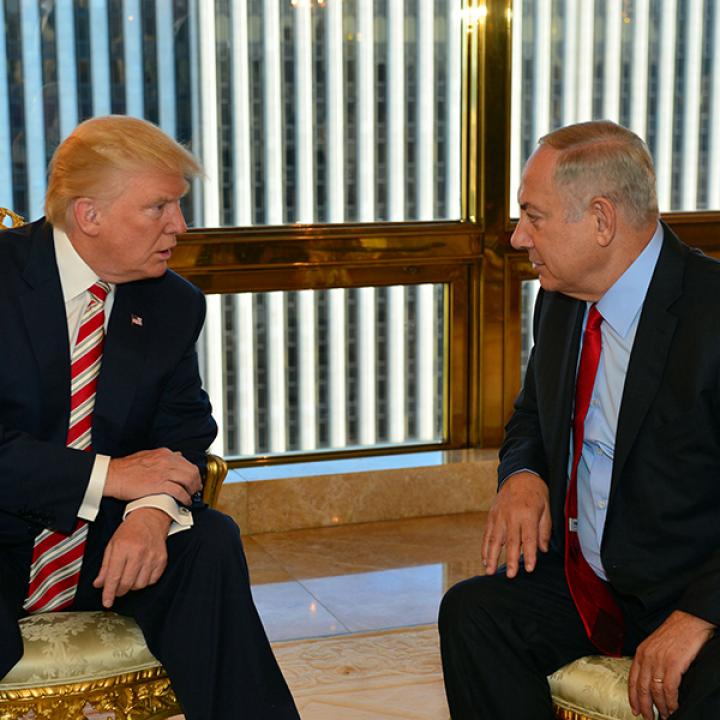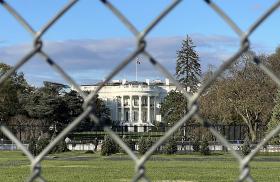
- Policy Analysis
- Articles & Op-Eds
Will Trump Dump Netanyahu? Here's When Israel Will Find Out
Also published in Haaretz

A ten-year memorandum of understanding lapses during the president’s term, and he will have to decide whether negotiating a new deal serves American interests.
When U.S. President Donald Trump was elected, there was euphoria among the right wing in Israel. Their prayers had been answered. He would give Israel a blank check to do whatever it wanted—apply Israeli sovereignty to the West Bank and defeat its enemies with no limitations. But in the four months since he took office, the Trump Administration is not, in any way, acting in accord with their expectations.
To be fair, their expectations were always disconnected from reality. President Trump’s desire to expand the Abraham Accords inherently contradicted Israeli desires to annex the West Bank, because for the Saudis this was the red line for normalization. Similarly, Trump’s desire to make a nuclear deal with Tehran also meant there would be no automatic backing for Israel’s use of force against Iran’s nuclear program. Of course, if diplomacy fails, the president might well support Israel’s use of force, but Trump has repeatedly made it clear he would like diplomacy to succeed and avoid the need for a conflict. So as long as diplomatic channels persist, Trump will oppose the Israeli use of force.
In that regard, it is noteworthy that U.S. sources revealed last week that new intelligence indicates that Israel is preparing a possible strike on Iranian nuclear facilities. They clearly did not “leak” this intelligence because they wanted to facilitate or encourage such a strike: just the opposite. If Israel acts, it will want to prevent Iranians from preparing, to maximize the surprise factor and ensure they are unable to move and hide centrifuges. True, the leak could have been designed to increase U.S. negotiation leverage on the Iranians by sending the message that they need to reach agreement or the Israelis will act. Regardless, the leak was not designed to make an Israeli strike more likely in the near term.
None of this means that the Trump Administration is not supportive of or is abandoning Israel. But it does mean that the notion that Trump would simply back whatever this right-wing, messianic Israeli government wanted was always an illusion.
If there were any doubts, consider a series of actions President Trump has recently authorized or taken. First, his team negotiated directly with Hamas over hostage releases and a possible ceasefire, something no other U.S. administration has ever done and without telling the Israelis. Although the recent deal may have been negotiated indirectly, it involved only the living dual U.S.-Israeli citizen, Edan Alexander, and excluded any other hostages, while also involving a U.S. commitment to restore humanitarian aid to Gaza.
Second was the decision to negotiate with the Iranians, but revealing direct talks only a few days prior while Prime Minister Benjamin Netanyahu was sitting in the Oval Office, where he had to restrain his response. Third was agreeing to a ceasefire with the Houthis that did not involve Israel, two days after a Houthi missile struck next to Ben-Gurion Airport, and not telling the Israelis of the ceasefire until afterwards. (In fact, the number of Houthi missile launches against Israel has increased since the American ceasefire.) Fourth was the decision to end U.S. sanctions against Syria, again without Israel knowing this was coming, even though Israel has major security concerns on the matter. And, finally, Trump’s visit to the region did not involve a stop in Israel, and instead included massive arms deals that could call into question the maintenance of Israel’s qualitative military edge—a commitment that is actually enshrined in U.S. legislation.
All of these decisions may well be justifiable. Their legitimacy or appropriateness is not the issue. The issue is that Israeli concerns or considerations were seemingly not taken into account. Many in Israel responded to all these moves, and especially the exclusion of Israel from Trump’s regional trip, by suggesting that at best Israel was simply irrelevant to the administration, and at worst there was a crisis in the relationship.
Reports of administration officials saying Trump was “frustrated” with Netanyahu and wanted to see an end to the war in Gaza seemed to validate those who argued that Trump was distancing from Israel or tiring of it. Of course, the lack of a White House response to the statement issued by the French, Canadians and the British condemning Israel for its action in Gaza and warning that if the military operation did not cease and aid was not permitted into the Strip, they would take “further concrete actions in response” also raised eyebrows.
So is President Trump veering away from Israel and less inclined to support it—or at least less inclined to support the Netanyahu government? The question may seem logical given the pattern of recent actions, but I think there is another explanation for them; namely, President Trump makes his decisions on what he sees as being in U.S. interests.
As a rule, Trump is focused on the U.S. and not the interests or concerns of its allies. Those are decidedly secondary for him. Talking to Hamas or the Iranians or accepting a ceasefire with the Houthis or closing a $142 billion weapons package with the Saudis all served American interests. That is what he considered, instead of what mattered to the Israelis—or for that matter the British, who have also been militarily acting against the Houthis. The British too were surprised by the ceasefire decision.
This conclusion may not reassure Israelis, but it should inform them that with this president, understanding how he defines U.S. interests is critical. Therefore, in order to get Israel’s interests on the docket, the Israeli government has to show how what Israel is doing will serve U.S. interests. And the fact that it is Israel, not the U.S., that changed the regional balance of power in the region, weakening Iran and its proxies Hezbollah and Hamas and increasing Iran’s need for a deal, serves America’s interests.
The good news for Israelis is that Trump wants to make sure Iran does not have a nuclear weapon and that it isn’t a threat to the region. The truth is that nothing is more important to Israel than that. It is also good that Trump believes that all Israeli hostages must be released and that Hamas must not be in control of Gaza. And it is good that Trump has continued approving the release of weapons to Israel rather than putting them on hold.
The less good news for the Netanyahu government is that Trump wants the war to end, both to see the killing stop and to make it possible to pursue Saudi normalization with Israel. The fact that Netanyahu’s government lacks a credible plan for ending the war and producing a day after wherein there is an alternative to Hamas is a major issue. It is not clear if Netanyahu’s current coalition with his far-right National Security Minister Itamar Ben-Gvir and Finance Minister Bezalel Smotrich can survive either such a plan or significant moves that the Saudis would require as part of normalization.
Patience is clearly not one of Trump’s attributes. So at any moment, he could decide that if the war in Gaza is off the table, and with it Saudi normalization, he will shift his attention elsewhere—as he may already be doing with the Russia-Ukraine war. This does not mean he will end support for Israel. Supporting Israel politically with very significant symbolic moves just as he did during his first term, such as moving the embassy to Jerusalem and recognizing Israeli sovereignty in the Golan Heights, reflects his basic orientation. But absorbing costs may be another matter. The Obama Administration’s ten-year memorandum of understanding in which the U.S. provides Israel roughly $4 billion a year in military assistance will lapse during this administration. Will a new ten-year deal be negotiated?
Israel’s decimation of Hezbollah and the related collapse of the Assad regime in Syria, as well as its destruction of Iran’s air defenses, may have created new openings in the region, but make no mistake: The multiple-front war Israel has been fighting since Hamas’s horrific assault on October 7, 2023, has come at a huge cost. Not just in blood, but also in treasure and the Israeli military’s capabilities and long-term needs. Addressing those needs makes the new U.S.-Israel military assistance deal for the next ten years critical.
A good measure of Donald Trump’s relationship with Israel and with Netanyahu will be how he approaches a new military assistance deal. And that is not a given.
Dennis Ross is the Davidson Distinguished Fellow at The Washington Institute and author of the new book Statecraft 2.0: What America Needs to Lead in a Multipolar World. This article was originally published on the Haaretz website.



